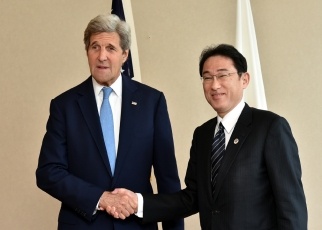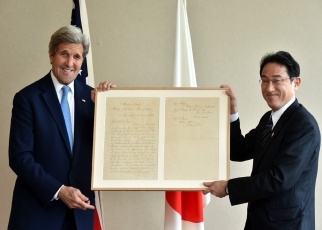Japan-United States of America Relations
Japan-U. S. Foreign Ministers’ Meeting



On Monday, April 11, commencing at 8:00 a.m. for approximately 40 minutes, Mr. Fumio Kishida, Minister for Foreign Affairs, held a Japan-U.S. Foreign Ministers’ Meeting with the Honorable John F. Kerry, Secretary of State of the United States of America during his visit to Hiroshima. The overview of the meeting is as follows.
1. Opening remarks
Minister Kishida explained that holding the G7 Hiroshima Foreign Ministers’ Meeting in Hiroshima is highly significant and that he believes that today is a historic day in light of Secretary Kerry and the other G7 ministers’ visit to Hiroshima Peace Memorial Park. Furthermore, Minister Kishida stated his intention to send a clear message of peace from Hiroshima to the world. In addition, Minister Kishida presented a replica of diplomatic documents to the United States Diplomacy Center, and expressed his hope that this would serve to be an invaluable exhibition that looks back on the long history of Japan-U.S. relations, which formed the foundation for today’s Japan-U.S. Alliance. In response, Secretary Kerry expressed his gratitude for the gift. Furthermore Secretary Kerry expressed his great pleasure to be able to visit Hiroshima on this occasion, in light of the fact that Hiroshima is the hometown of his friend Minister Kishida, and because it holds special meanings in terms of the strength of Japan-U.S. relations and the journey that Japan and the United States have traveled together since the difficult times of the war until today. Furthermore, Secretary Kerry said he was pleased to visit the Hiroshima Peace Memorial Park on this day together with Minister Kishida and the other G7 Ministers. Moreover, Secretary Kerry underlined the importance of peace, making efforts to ensure that the strong allies contributes to making the worldsafer and the leadership of Japan and the United States for nuclear disarmament and non-proliferation. Secretary Kerry also stated that his visit on this occasion is aboutthe present and the future, that it is especially an indication of the strong relationship that Japan and the United States have built over the years, and that it strongly calls to mind the need for Japan and the United States to ensure that their friendly relations and robust alliance contributes to peace. Furthermore, Secretary Kerry expressed his appreciation for Japan as a strong ally and for the significant role played by Japan in the international community, including issues regarding Afghanistan and Syria.
(Note) Replicas of a diplomatic letter from President Abraham Lincoln to Tokugawa Shogun Iemochi and a medal and gold watch with President Buchanan’s portrait were presented. The letter is addressed to Tokugawa Shogun Iemochi and signed by President Abraham Lincoln on November 14, 1861, announcing the return of Townsend Harris the first U.S. diplomatic representative in Japan.. The medal and the watch were presented to Japanese diplomatic mission to the United States headed by Masaoki Shinmi, which was dispatched to the United States to exchange documents for the ratification of the Treaty of Amity and Commerce in 1860.
2. Japan-U.S. Security Alliance
Minister Kishida expressed his intention to further strengthen the deterrence capability of the Japan-U.S. Alliance, in line with the Legislation for Peace and Security and the new Guidelines for Japan-U.S. Defense Cooperation. Concerning the lawsuits on the Henoko landfill permit, Minister Kishida explained that Japan's position remains unwavering that the relocation of Marine Corps Air Station (MCAS) Futenma to Henoko is the only solution and that Japan decided to accept a court-suggested settlement under the philosophy of ''haste is waste.'' Minister Kishida also stated his intention to realize the return of MCAS Futenma through the completion of the relocation to Henoko at the earliest possible time and would like to continue joint efforts to mitigate the impact on Okinawa. In response, Secretary Kerry said that he fully understands the decision of the Japanese government to adhere to the court-suggested settlement on the relocation of MCAS Futenma to Henoko, and stated his intention to continue to cooperate with Japan to relieve the burden on Okinawa.
In addition, Secretary Kerry commented on the increasing importance of the presence of the U.S. forces and the Japan-U.S. Alliance in light of the increasingly severe security environment, including the situations in North Korea, the East China Sea, and the South China Sea. The two ministers agreed to work together to strengthen the Japan-U.S. Alliance.
3. TPP
The two sides agreed on the importance of the early entry into force of the TPP Agreement.
4. Regional Affairs
The two sides discussed regional affairs and shared the view that Japan and the United States will cooperate with the relevant countries, while continuing to work closely with each other.
Furthermore, Secretary Kerry underscored the importance of measures to combat terrorism and violent extremism, and appraised Japan’s contributions in this regard. Minister Kishida said he intends to maintain close Japan-U.S. cooperation.


